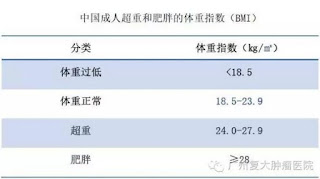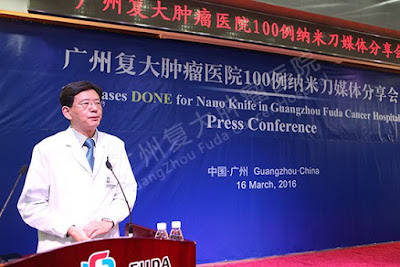The BMI of overweight and obesity among Chinese adults
| |
Classification
|
BMI (Kg/m3)
|
Low weight
|
<18.5
|
Normal weight
|
18.5-23.9
|
Overweight
|
24.0-27.9
|
Obesity
|
≥28
|
Why cancer is obesity related?
Cancer is the second cause of death in Cuba with a total of 20,000 fatalities each year
Dr. Li Jialiang said that obesity increases the risk of cancer is not caused by a single factor, but a result of a variety of factors over a long-term effect. Currently, the research on the relationship between obesity and cancer is mainly from large-scale epidemiological studies and the research on obesity-related cancer has just started. The research is mainly from animal experiment result.
- Obesity provides a breeding ground for the growth of cancer cells
Recent studies show that large amount of cells, including fibroblast, endothelial cells and fat cells are found around cancer cells. As fat cells and cancer cells feed each other, they are creating a symbiotic environment where cancer cells could thrive. Therefore, fat tissue, as a part of tumor microencironemnt, is having an effect on tumor growth and metastases and tumor recurrence.
- Obesity is the stimulant for tumor cell growth
In fact, fact cells not only feed tumor cells but also release some stimulants that can make tumor progress even rapidly. Fat cells can release some substances, including adipokine, proinflammatory cell factors and pro-angiogenic factors that may trigger tumor growth and metastases. Therefore, the occurrence rate of cancer among obese people is higher than that of common people; so is the mortality rate.
- Obesity is chronic inflammation in essence
The accumulation of abdominal fat will put the body in a state of chronic inflammation, which can induce the occurrence and development of cancer. Chronic inflammation can send a signal to cell division. As new cells are needed to heal the wound after injury, the signal that encourages cell growth also support cell division. At the same time, obesity can cause an increase in some of the specific macrophages. Those immune cells will cause immune suppression directly. As the immunity of local tumor is suppressed, tumor cells will become even more rampant.
- It is related with the increased estrogen level
Postmenopausal overweight or obese women will have increased probability of developing breast cancer. Every 5kg increase in weight means 8% increase in the probability of breast cancer occurrence, which may be associated with elevated estrogen level. Before menopause, estrogen is mainly produced by the ovary cells, but fat cells can also produce estrogen. After menopause, the ovaries will stop producing estrogen and fat become the main source of hormone. Noticeably, fat tissue can generate considerable amount of estrogen. It is known to all that 70% of breast cancer is caused by the effect of estrogen and higher estrogen levels will lead to higher susceptibility to breast cancer. Once postmenopausal women become obese, the endogenous estrogen levels will become significantly higher and so is the risk of breast cancer.
Weight loss is helpful reduce cancer risk
Dr. Li Jialiang noted that weight loss is a powerful measure to reduce cancer risk. To this end, diet control and regular exercise are very important.
- Reduce the intake of high-sugar and high-fat food
Firstly, we should reduce the intake of high-sugar and high-fat foods and drinks, such as sugar drinks, pastries, fast food, etc. Moreover, we should also reduce the intake of red meat, such as pork, beef, mutton and eat less high temperature processed meat products, such as sausage, canned foods (which contains preservative), and so on. Obese people, in particular, should avoid sugary carbonated drinks. A bottle of Coca-Cola (500ml) contains 215 kcal. To have the energy consumed, we need to run on a treadmill for 40 minutes, which equals to 3 km. At the same time, we should eat more fresh vegetables, fruits, whole grain wheat foods, such as pasta, whole wheat bread, brown rice, oats and the like. Food with less fat meat and dairy products are preferred.
- Avoid overeating
Even if we are on a low-fat and plant-based diet, we should also pay attention to the amount of food we eat. We should have food in a regular and balanced manner and the amount of food taken only needs to meet the body’s normal requirement. To lose weight, we do more exercise and have less food intake. We will never lose weight no matter how much exercise we do if we keep on eating.
- Regularly participate in activities and physical exercise
Exercise plays a very important role in maintaining body weight as it can burn calories. At the same time, exercise will also help release the pressure so as to avoid overeating caused by emotional disorder. Adults should have at least 30 minutes of moderate exercise five days a week, such as running, swimming and riding so as to build up the body and reduce cancer risks. Studies have shown that regular exercise can reduce the risk of colorectal cancer by 40-50% and the risk of breast cancer by 30-40%. To maintain a long-term healthy state, exercise should be a daily work for everyone. .
Meanwhile, Dr. Li Jialiang reminded, "Obesity or overweight is certainly bad for your health, but it doesn’t mean that the slimmer you are, the healthier you are. The most suitable BMI is between 18 and 24. If the BMI is lower than 18, it also indicates ill health. Leanness will lead to malnutrition and lower the immunity, which will also increase the risk of multiple diseases.


